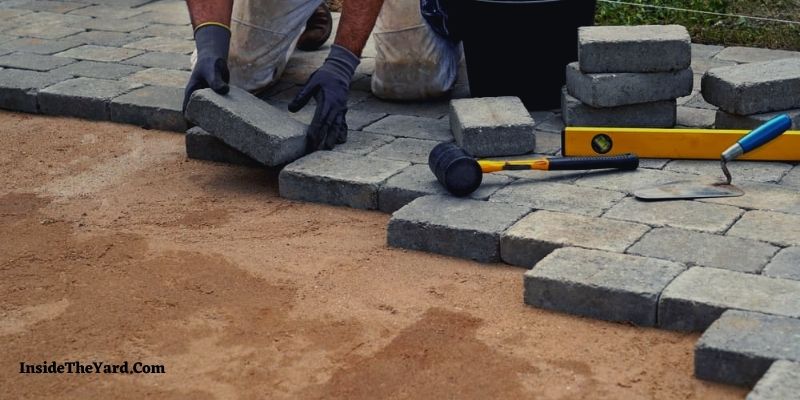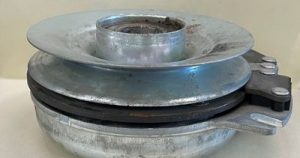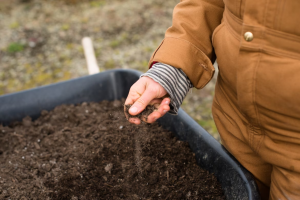What Happens If It Rains When Installing Pavers? – Know Before Facing Damage

What happens if it rains when installing pavers? Is it a bad idea to start installing pavers during the rainy season? Rain might lose the paver’s sand, concrete and weaken the stiff mixture due to clogged water.
Indeed, we can’t predict anything about the weather. In case of some renovations in the garden or decorations during parties, we feel this uncertainty. During installing the pavers, heavy rain might interrupt the installation process.
So, we are here with some solutions to your problems.
If you are excited to plan a beautiful backyard with pavers, this article is for you. Go through this article to get some ideas.
Table of Contents
What Happens If It Rains When Installing Pavers?
It won’t be easy to install the pavers.
Rain causes fewer interruptions when it comes to light rain. During drizzling rain, you can almost complete half of the process like installing a drainage system, excavating, placing curbs and edges, etc.
There’s nothing to worry about if it is drizzling. If the sands are placed between joints of the pavers, just let them sit there. When sunlight comes, the sands will dry quickly.
Contrarily, there will be no sand between the joints if there is heavy rainfall. They will get washed away.
So, heavy rain during paver installation is a bigger blunder as water won’t let the mixture harden.
That’s why we suggest you start the process after the rainy season leaves. Reschedule and wait till the equipment dries.
It’s better to postpone the plan for good weather if you don’t have enough precautionary steps.
Can You Lay Block Paving in The Rain?
It can be a bit challenging to lay the pavers in the rain.
Experts say to use dry blocks while installing. Wet blocks expand and shrink when they dry. So it would be best if you avoided this thing to make a solid base. Again while it is drizzling, you may complete half of the work as rain doesn’t interfere much at that time. But work may stop during heavy rainfall.
Scorching heat, heavy rain, and hard frost oppose the pavers’ installation. You may complete laying it somehow, but it may not last longer or may not make a strong bond or make a weak base.
That’s why you should always try to be updated with the weather. Start to lay block paving at an optimum temperature and time. Follow the manufacturer’s instructions. It will be easier to get work done faster.
How to Protect New Built Pavers from Rain?
You can protect newly built pavers through paver sealant.
After installing pavers, a new problem arises about protection from harsh weather. It’s all about creating a complex bond when it comes to pavers and cement.
If you seal the pavers properly with a suitable film-forming sealant, rain on the paver base won’t cause any harm to the pavers.
There are two types of sealants-
If you don’t have a much better concept about these things, hire a professional to get a perfect look. Start to apply it in summer as it will take only a few hours to dry.
50-90°C is the ultimate temperature for the application of the sealant. You may think, “Can you lay pavers in rain?” So, we just have discussed that also.
How Long Does Polymeric Sand Need To Dry Before Rain?
It is suggested to wait for 24-36 hours for polymeric sand to dry.
Polymeric sand is a mixture of sand and polymer. It was used widely around the 2000s due to quick progress, easy installation, and strong stabilization.
The polymeric sand must reach deep to the gap between the pavers. It needs to dry the pavers for wet areas to work fully.
A common problem usually arises is that the joints sometimes remain soft. It means it is soaked inside, and you have to wait a little bit longer. So, if the polymeric sand is not hardening yet, then there must be a moisture issue.
I recommend you check the weather before starting. You will need at least two days of sun. Avoid buying cheap ones. Do not exert high pressure while cleaning it. Use a light pressure shower nozzle to seal the pavers and harden them quickly.
How Long Does Polymeric Sand Take to Harden?
Polymeric sand takes around a day to harden.
It is suitable to lock the pavers between the joints and is used for durable Joints. After placing the pavers one after another, you have to dampen them. Then it will get settled and hardened.
The more time passes, the more it will be hard to break. It takes a minimum of a day to harden for light transport and two days for vehicular transportation.
You can’t use polymeric sands everywhere in pavers joints like a stream of water, or the continuous movement of vehicles. Also, what if it rains after laying slabs? In that case, all the polymeric sands may fall apart and get separated.
You May Like This Video Too!
Frequently Asked Questions (FAQs)
What Happens When Water Gets Under Pavers?
Water under the pavers may destroy the integrity of the foundation. Water frequently clogs under the pavers when it rains. It may be a big problem. It mainly happens to owe to a lack of proper planning of the drainage system.
Should Sand Be Wet When Laying Pavers?
No, sand should be dry and the pavers too. Between the pavers, sand is needed to make a tight joint. Pavers and sand will change a little bit in position when it gets dry. So sand shouldn’t be wet.
How to Stop My Pavers From Shifting?
After installation, the sealant is mandatory. Pavers frequently shift due to faulty bases. Plan for a primary and strong foundation, put pavers one after another, and lastly, seal the edges to stop them from shifting.
What Might Happen If Heavy Rain Falls 5 Hours After Concrete Is Poured?
Heavy rain makes the concrete mix weak. After the concrete work has been finished, you should let it dry for 4-8 hours. But heavy rain does the opposite to it. Cover the concrete so that it doesn’t mix up with water.
How Long For Concrete To Dry After Rain?
It takes approximately 4-8 hours for the concrete to dry. After installation, water is necessary to make a firm bond, but driving water in the form of rain can delay concrete from drying. Light rain may cause minor damage.
Conclusion
We all like to have a unique ambiance outside our homes. Pavers, blocks, and slabs bring out the best look when you use them to decorate your backyard.
But nobody can say anything about the weather. What happens if it rains when installing pavers? Rain may interrupt your progress but don’t worry. You can continue working when it is drizzling.
Heavy rain may cause damage to the newly installed pavers and sand. Though water is mandatory for the hydration of the concrete, a heavy waterfall may weaken the mixture.
You will get to know more about polymeric sand, concrete, installing pavers, problems arising from their use, and many more.







